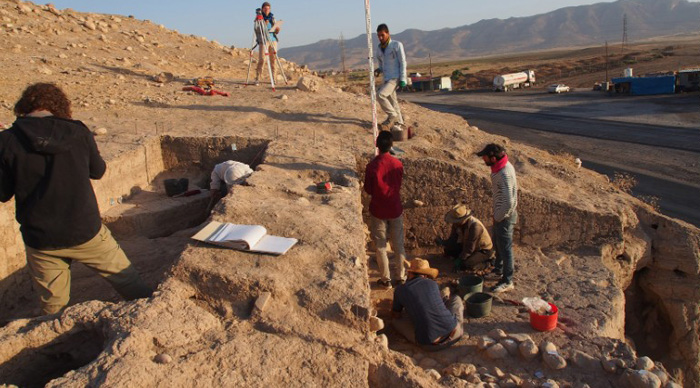Archaeologists announced this week that they discovered the remains of a Bronze Age city in northern Iraq, less than 30 miles from Islamic State territory.
A research team from the Institute for Ancient Near Eastern Studies (IANES) at the University of Tübingen in Germany uncovered the settlement in the small town of Bassetki in Iraqi Kurdistan. Researchers found concrete evidence of the settlement, including a large stone wall and a temple likely dedicated to the Mesopotamian weather god Adad. The city dates back to 3,000 B.C. and thrived for about 1,200 years. Archaeologists also discovered nearby other, later settlement layers at the site dating back to the Akkadian Empire, perhaps the first world empire, from the late 3rd century B.C.
The discovery underscores how much history is still buried beneath a country wracked by war. “The area around Bassetki is proving to be an unexpectedly rich cultural region, which was located at the crossroads of communication ways between the Mesopotamian, Syrian, and Anatolian cultures during the Bronze Age,” said Professor Peter Pfälzner from the University of Tübingen, one of the lead archaeologists at the site. Some 300 archaeological sites have been discovered in the region since 2013.
Pfälzner and Hasan Qasim, an antiquities expert, led the excavation. They operated out of Dohuk, only 50 miles from the embattled Islamic State stronghold of Mosul, where Iraqi security forces are currently engaged in a street-to-street battle to take back the city. Islamic State militants are leaving a trail of mass graves, murdered civilians, and other horrors in their wake as they lose ground.
But digging on the outskirts of a war zone didn’t dissuade the research team. “The protection of our employees is always our top priority. Despite the geographical proximity to [the Islamic State], there’s a great deal of security and stability in the Kurdish autonomous areas in Iraq,” Pfälzner said.
The Islamic State has targeted archeological experts and sites in the past. In August, 2015, the group beheaded renowned antiquities scholar Khaled al-Asaad in the Syrian city of Palmyra, a UNESCO World Heritage site laden with ancient ruins. Asaad refused to lead militants to hidden ancient artifacts. The Islamic State destroys antiquities or loots them to bankroll its war machine.
But with the Islamic State on the defensive in strongholds like Mosul and Raqqa, the threat to archaeologists, and the fragile sites they are excavating, may be abating.
“We’re planning to establish a long-term archaeological research project in the region in conjunction with our Kurdish colleagues,” said Pfälzner.







Comments